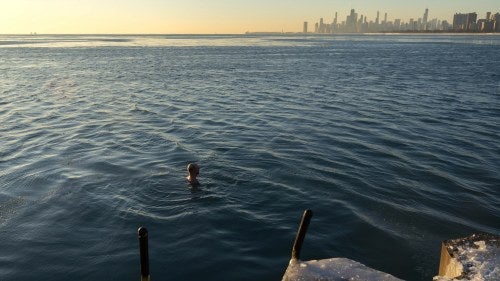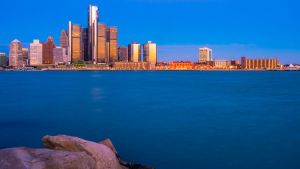How Chicago Could Be a Key Player in the Global Blue Economy

As the climate crisis grows, the business of water is increasingly important — and the lakefront city of Chicago could be one of its most valuable global leaders.
As global economies shift to more sustainable business practices and energy production, alternative fuels and carbon capture take up plenty of space in the public sphere. Often overlooked by investors and leaders, though, is the importance of water to economic development.
“If you're a company that's making a decision about a 20- or 30-year investment in a plant, water availability today [should be] one thing that you care about,” Alaina Harkness, CEO of Chicago-based water innovation and development nonprofit Current, told ChicagoGlobal.
Harkness, who is a former non-resident fellow at The Chicago Council on Global Affairs, believes that what is known as the blue economy will play an increasingly important role in global development in the coming years.
For Chicago, and the Great Lakes region more broadly, there is potentially much to gain from becoming a leader in this space — especially since water is on track to be a much scarcer resource in the near future.
What is the blue economy?
Precisely defining the blue economy has been an inexact process, with global groups releasing varying definitions in recent years. The World Wildlife Fund (WWF) has noted that "for some, blue economy means the use of the sea and its resources for sustainable economic development. For others, it simply refers to any economic activity in the maritime sector, whether sustainable or not."
For Harkness, the blue economy consists of a “heterogeneous” group of industries relating to the use of water, inclusive of everything from fishing, offshore wind, deep-sea mining, and water treatment to demand-side industries like agriculture, manufacturing, cloud computing, and food and beverages.
She noted most global companies “are dealing with water scarcity in totally different regions,” and that the blue economy is core to the sustainable growth of much of the world economy.
While Harkness and her team at Current are focused on developing Chicago and the Great Lakes region as a key player in the blue economy, numerous other global cities — most commonly those adjacent to oceans — are also jockeying to develop the kinds of core water-based technologies that will be useful in the future.
These include Singapore, whose National Water Agency last fall launched an open grant call to develop “breakthrough water technology” inclusive of desalination, water reuse, water treatment, decarbonization and more.
In addition, Harkness described the Netherlands and Israel as additional global leaders in the blue economy — the former for developments in flood control and green infrastructure and the latter for developments in desalination and cybersecurity of water assets.
Chicago's strategic global advantage
But according to Harkness, Chicago — and the Great Lakes region more generally — has a significant advantage in the blue economy that should be better capitalized on going forward.
The Great Lakes account for 21% of the world’s freshwater and 80% of North America’s freshwater, providing a valuable and increasingly scarce resource that many types of businesses need to access to.
“We’ve got this abundant resource right in our backyard,” explained Harkness. “That’s a huge deal for us in terms of our overall competitive advantage with resource availability.

A satellite image of the Great Lakes, captured by NASA Goddard Space Flight Center.
“It is mostly meaningful for the folks on the demand side — people that are making strategic decisions about where they locate because they need access to water availability.”
This is especially true because, Harkness explained, it’s extraordinarily expensive to move water long distances. Some leaders in the Southwest, where groundwater access is rapidly dwindling, have toyed with the idea of importing water from regions where it’s more abundant — basically, “sticking a straw in Lake Michigan and pumping water to Arizona,” as Harkness puts it. But she characterizes such thinking as a “moonshot” that lacks feasibility for regulatory, practical, and business reasons. As long as such technologies remain impossible, businesses that want to take advantage of the Great Lakes’ water will need to locate themselves near the Great Lakes.
One nascent industry already seeking to take advantage of Chicago’s proximity to Lake Michigan is quantum computing. Last month, the startup PsiQuantum announced that, in the wake of a successful pilot project in Australia, it would be building a campus on Chicago’s South Side to house “the first U.S.-based utility-scale, fault-tolerant quantum computer.”
According to Harkness, at play was not only access to the University of Chicago’s quantum computing hub Chicago Quantum Exchange, but also Lake Michigan, as quantum computing systems require a great supply of water to keep them cool.
A changing world
With the climate crisis heightening and past efforts to stymie global carbon output largely insufficient, Harkness described a high likelihood that water will become an increasingly scarce resource in the decades to come. Such a development — while destructive for wildlife ecosystems and humanity — could also lead to increased land value for the Great Lakes region.
“We have the perception that our water is sort of an infinite resources, when really it’s a constrained abundant resource that we’re very fortunate to have here,” said Harkness. “Right now, the price of water is frankly reflecting conditions today in our region — it’s not reflecting the potential for growing scarcity to force other industries to make choices to relocate here.”
We’ve got this abundant resource right in our backyard. That’s a huge deal for us in terms of our overall competitive advantage with resource availability
 Alaina Harkness
Chief Executive Officer, Current
Alaina Harkness
Chief Executive Officer, Current
Harkness argued that the blue economy has “not been on the radar” of major investors and venture capitalists relative to decarbonization efforts in the energy industry, and that this is a mistake given that achieving clean energy goals — and climate goals more broadly — is going to depend on “much more innovative ways of managing water.”
She continued: “When we forecast into the future, given climate trends, one thing we can predict is that — because we know with certainty water challenges and crises are on the rise in every single corner of the globe — the needs for water solutions are going to rise sharply. It’s already happening. That is both going to drive demand up for our water. It’s also going to drive up demand for the kinds of technologies that we happen to be really good at making here in the Great Lakes.”
To that end, Current was heartened to have received a $160 million grant from the National Science Foundation early this year to help accelerate its research and development of key water technologies. The nonprofit has also previously received grants from the Department of Commerce’s Economic Development Administration and the Department of Labor for its workforce development pilot, which is meant to help create pathways to train more people for blue economy jobs.
With the grant money, Current will seek to execute new ways to recover and reuse water, energy, nutrients, and critical materials from the Great Lakes.
“We've done a really great job hiding all the investment and the innovation [in water],” Harkness said. “We take it for granted, from what comes out of our tap to what we flush away. It's just one of those extreme privileges of living in a highly developed economy — we just don't have to think about it.”
Harkness paused, then added: “But we all have to think about it.”
This story first appeared in the ChicagoGlobal newsletter, a joint project of Crain's Chicago Business and the Chicago Council on Global Affairs.


Related Content
 Global Cities
Global Cities
Economic globalization has revitalized many once struggling cities (think New York, Singapore, Shanghai, and London) and created or re-created metropolises like Doha, Dublin, and Frankfurt.
 Food and Agriculture
Food and Agriculture
This report examines the urgent challenges created by water scarcity and the impact on food security.

